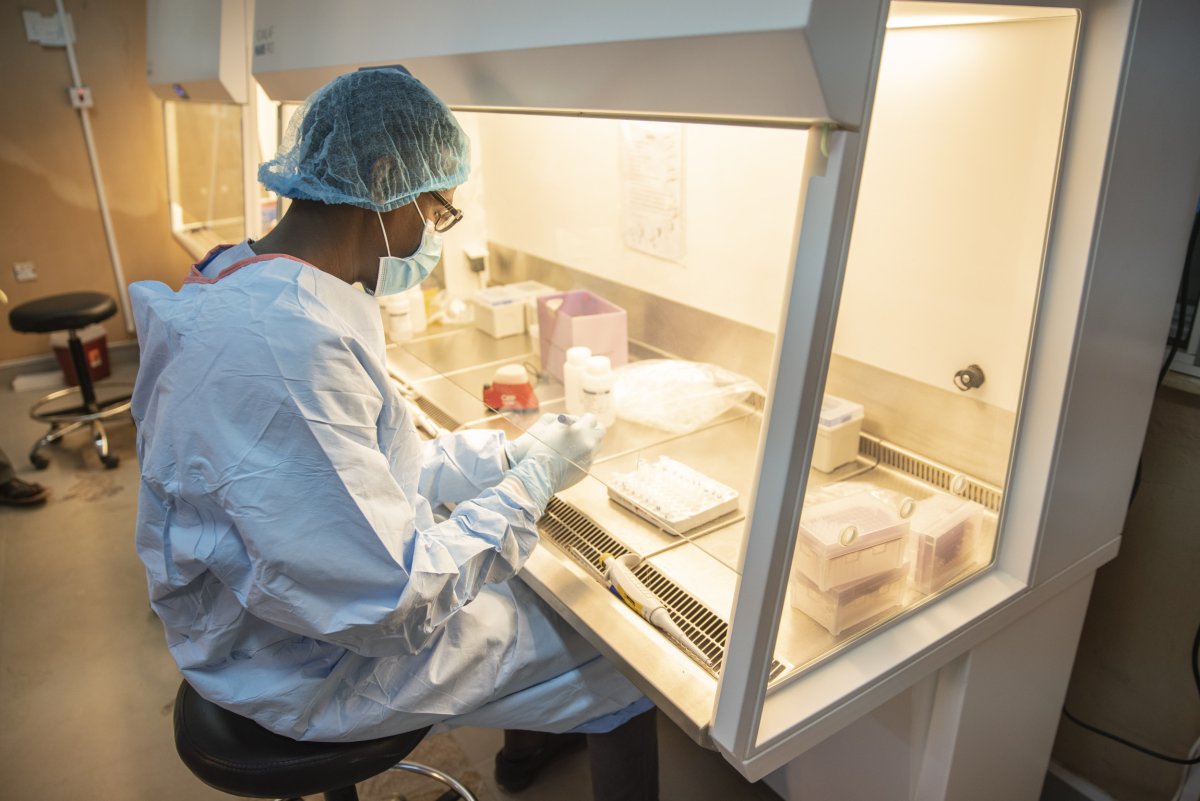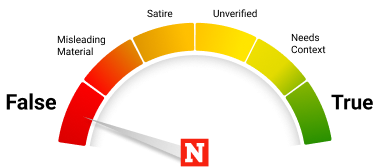The conflict in Sudan between the country's military and forces controlled by a junta, leaving 427 people dead and 3,700 injured, was made even more perilous as militants took control of a public health laboratory containing deadly pathogens.
A World Health Organization representative said technicians were unable to access the National Public Health Laboratory (NPHL), in the capital city of Khartoum, describing it as an "extremely, extremely dangerous" situation.
The news triggered claims that the lab—which housed pathogens including those that cause polio, cholera, and measles—had been funded directly by the U.S. government.

The Claim
A tweet by user @amuse, posted on April 27, 2023, viewed 30,000 times, stated that "The US needs to rethink its policy of funding biolabs in countries like Ukraine and Sudan. Sudanese fighters have just seized a U.S.-funded biolab in Khartoum and the WHO is warning of a 'germ bomb'."
The Facts
U.S. involvement in overseas bio lab research has piqued conspiratorial interest since the pandemic, particularly around the government's links with the Wuhan Institute of Virology.
Reporting showed that the National Institutes of Health gave U.S.-based EcoHealth Alliance a $3.7 million grant in 2014, $600,000 of which was sent to the Wuhan Institute of Virology to study bat coronaviruses.
Dr. Anthony Fauci, who had been a key member of NIH since 1984, denied repeatedly to Congress that the funding had been used for "gain-of-function" research, which seeks to enhance viruses to predict their evolution.
The tweet by @amuse included a link to an article that mentions the Wuhan lab too.
However, in the case of NPHL, there is little to no evidence of direct U.S. funding, at least not for research efforts.
While the article tweeted by @amuse did not include any sources, its claims appear to come from former Trump adviser Steve Bannon's website the War Room, part of a media operation that has been associated with repeatedly sharing misleading and unsubstantiated information.
The War Room article claimed the NPHL had received support from "the Department of Defense (DOD), Centers for Disease Control and Prevention (CDC), and United States Agency for International Development (USAID)".
However, the article repeatedly mistakes Sudan for South Sudan, a different country. South Sudan gained independence from Sudan in 2011.
It mentions CDC support for the NPHL in South Sudan, the National Institute of Allergy and Infectious Diseases' (NIAID) connection to a South Sudanese NPHL researcher, and contributions by USAID toward improvement works at South Sudan's NPHL.
The War Room found one financial link between the U.S. and the Khartoum lab, but this was part of $98 million in COVID-19 supplemental support for Sudan, of which the NPHL's involvement was one component.
Crucially, the designation of this funding to the NPHL was purely to fund "procurement of COVID-19 tests" and provide equipment "for Sudan's national public health laboratory and designated regional laboratories to rapidly scale up testing capabilities", not to fund bio lab research.
A spokesperson for the CDC said: "There seems to be a confusion between Sudan and South Sudan, two independent countries.
"We were not involved with the Lab in the capital of Sudan. We, however, established an office in South Sudan in 2006 to work on HIV prevention through the U.S. President's Emergency Plan for AIDS Relief."
A USAID spokesperson added: "The [War Room] article is referencing a 2018 WHO press release relating to support to South Sudan, which is a different country than Sudan.
"In September 2021, USAID provided a small grant ($640,000) to the World Health Organization to strengthen the capacity of Sudan's National Public Health Laboratory as well as nine sub-national laboratories to detect and trace COVID-19 cases.
"These funds were used to provide training, testing kits, equipment for safe sample collection, and equipment to improve the labs' ability to collect and share information with each other.
"USAID funds did not support research involving scientists from Sudan's National Public Health Laboratory."
Newsweek has emailed the NIAID and the DOD for comment. Attempts have been made to contact the Sudanese government and the NPHL.
At best, there is a tangential link between the U.S. government and the NPHL through the World Health Organization (WHO). The WHO, of which the U.S. is one of the largest funders, has previously supported the NPHL in preventing or treating infectious diseases across the country.
So while in theory, taxpayer money may have arrived at the lab through WHO (to support public health programs) it was not a result of U.S. decision-making, nor was it used to fund the kind of work the tweet and the War Room suggests.
In a loose sense, the U.S. has funded a lab that carries out biological research, but this is a far cry from describing it as a U.S.-funded bio lab and the implications that carries.
Without forensic scrutiny of all overseas funding from the U.S. in the lab's history, we can't say with certainty that the U.S. has never contributed toward biological research at the NPHL. However, the evidence that's been used to assert this claim so far is irrelevant.
As fighting continues in Sudan, the U.S. has warned its warring generals against hiring Wagner Group mercenaries to join the conflict.
The State Department told Newsweek it has warned both sides—the Sudanese army led by General Abdel Fattah al-Burhan, and the RSF paramilitaries led by General Mohamed Hamdan Dagalo—not to turn to Russian Wagner Group mercenaries operating in Sudan.
"The Wagner Group is a destabilizing influence wherever they deploy," a State Department spokesperson said.
"The security and safety of U.S. citizens is our utmost priority. We have communicated to the leaders of Sudan and the surrounding states, the inadvisability of allowing the Wagner Group to enter into this conflict."
The Ruling

False.
The claims on Twitter were based on an article published by Steve Bannon's War Room which mistook Sudan for South Sudan, a completely different country.
While the U.S. has financed other organizations which have in turn supported the National Public Health Laboratory in Khartoum, and directly funded COVID-19 resources for the laboratory, there is no evidence to support the claim that the lab is a U.S.-funded bio lab, in the sense the tweets and the article imply.
FACT CHECK BY Newsweek's Fact Check team
Uncommon Knowledge
Newsweek is committed to challenging conventional wisdom and finding connections in the search for common ground.
Newsweek is committed to challenging conventional wisdom and finding connections in the search for common ground.
About the writer
To read how Newsweek uses AI as a newsroom tool, Click here.






